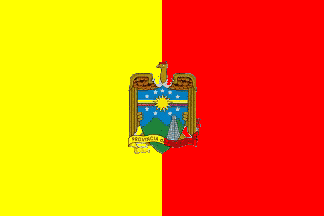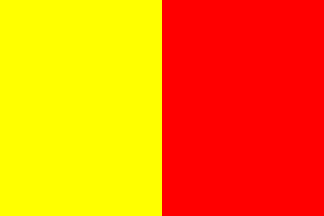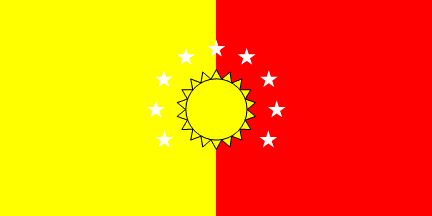 klaus-michael schneider
klaus-michael schneider
Keywords: ecuador | pichincha | quito |
Links: FOTW homepage | search | disclaimer and copyright | write us | mirrors

FOTW beschäftigt sich mit der Wissenschaft der Vexillologie (Flaggenkunde).
Alle auf dieser Website dargebotenen Abbildungen dienen ausschließlich der Informationsvermittlung im Sinne der Flaggenkunde.
Wir distanziert uns ausdrücklich von allen hierauf dargestellten Symbolen verfassungsfeindlicher Organisationen.
Last modified: 2021-08-26 by  klaus-michael schneider
klaus-michael schneider
Keywords: ecuador | pichincha | quito |
Links: FOTW homepage |
search |
disclaimer and copyright |
write us |
mirrors
 image by Antonio Martins, 8 January 2003
image by Antonio Martins, 8 January 2003
Cantons of Pichincha:
See also:
External links:
Pichincha is a province in northern central area of Ecuador,
and belongs to Sierra region. It includes the
capital Quito.
Željko Heimer, 15 Jul 1996
Pichincha province (2,576,287 inhabitants; 96,120 ha) is located in the north
of the country.
Ivan Sache, 18 September 2018
The flag of Pichincha was adopted on 8 May 1979 by the province government.
The flag is divided into two vertical parts, the one golden yellow and the other
red. In the center of the flag is placed the coat of arms, which shows a sun
surrounded by nine stars symbolizing the union and power of the nine cantons
that originally composed the province.
http://www.pichincha.gob.ec/pichincha/simbolos
Canton website
Ivan Sache, 18 September 2018
Note that in pichincha.gov.ec,
the flag is charged with the Coat of
Arms.
Falko Schmidt, 29 October 2002
Falko Schmidt reported from a government website what seems to be legal
text prescribing the version with the arms. This URL is unavailable live
but was archived;
however the image file was not archived along with the text, which does
not refer the flag.
António Martins, 27 Jul 2017
 image by António Martins, 31 Jul 2017
image by António Martins, 31 Jul 2017
Flag of Pichincha Province.
Jaume Ollé, 08 Sep 1996
It is a yellow and red vertical bicolor, and, as with many such
flags, it seems that the official version includes the
coat of arms, with this plain design being an
unofficial version, tolerated in order to allow inexpensive flag
production.
António Martins, 27 Jul 2017
 image by António Martins, 27 Jul 2017
image by António Martins, 27 Jul 2017
Jaume Ollé reported in 1996 an armless 1:2 bicolor of yellow and
dark (?) red.
António Martins, 08 Jan 2003
I would say that the exact ratio (and even exact color shades) are
scarcely relevant in the context of these simplified variants.
António Martins, 31 Jul 2017
 image by António Martins-Tuválkin, 26 July 2017
image by António Martins-Tuválkin, 26 July 2017
Based on www.edufuturo.com.
Mello Luchtenberg, 26 Jul 2005
It is, like the confirmed design, a yellow and
red equal, vertical bicolor. Mello’s image is 1:2, with two
squares; on the dividing line there is a sun disc with 18 regular rays
pointing up, made of equilateral triangles connected to each other and
to the edge of the sun disc, all yellow with black contour lines; in an
arc around the sun, from 8 to 4 o’clock, nine white five-pointed
regular stars, pointing up; the diameter of the sun disc is slightly less
than the 1/3rd of the flag’s height, while the total width of the
emblem (from the hoist side tip of the hoist side star to the fly side tip
of the fly side star) is just under 2/3rds of the flag’s height.
(These exact measurements were either transposed from the original image
by Mello or interpreted by him from a non-flat design.)
António Martins, 26 Jul 2017
A sun and a ring of stars are indeed the main elements of the
provincial coat of arms. Why would an Ecuadoran
provincial flag be showing neither a plain flag nor the
same with its emblem but instead this apparent simplification of the
latter? I don’t know: It is either another mistaken vexillological
report, someone’s musing, or an actual (official) previous or
alternate flag.
António Martins, 26 Jul 2017
 image by Željko Heimer, 27 Jul 2017
image by Željko Heimer, 27 Jul 2017
A yellow and red horizontal bicolor.
António Martins, 26 Jul 2017
Flag according to W. Smith (insecure).
Željko Heimer, 15 Jul 1996
It may be either an incorrect report or a variation — or a
combination of both things.
António Martins, 08 Jan 2003
It is, I believe, from [smi82]. It
seems to be a case of incorrect reporting or filing, by which vertical
become horizontal.
António Martins, 27 Jul 2017
 image by Jaume Ollé, 27 Jul 2017
image by Jaume Ollé, 27 Jul 2017
A green and red vertical bicolor.
António Martins, 26 Jul 2017
Previously reported wrong flag.
Jaume Ollé, (13 Oct 1997)
It seems to be a case of incorrect reporting or filing, by which
yellow become green.
António Martins, 27 Jul 2017
p.gif) image from Explored.COM.EC, 26 Jan 2001
image from Explored.COM.EC, 26 Jan 2001
Flag and Coat of Arms can be seen at explored.com.ec.
Jarig Bakker, 26 Jan 2001
The coats of arms in Explored.COM.EC and in
Pichincha.GOV.EC are different in detail — we’d
like to know more on this.
António Martins, 08 Jan 2003
A sun and a ring of stars are the main elements of the provincial
coat of arms (though some versions show less than nine
stars), which shows also as elements of the shield a background fess
patterned after the national flag, two mountain
peaks, and a kind of obelisk, along with a condor as single supporter and
a scroll patterned after the provincial flag itself, reading
"PROVINCIA DEL PICHINCHA" in black capitals.
António Martins, 26 Jul 2017
Each of the elements constitutive of the coat of arms symbolizes the history,
identity, culture and nationality of the province. The landscape shows a
celestial blue sky crossed horizontally by a scroll in colors representing its
nationality. In the center of the scroll is a sun surrounded by nine stars [see
above]. The two green heights in the lower part represent the La Marca
mountains, an historical site where the pre-Colombian populations celebrated the
Equinox Festival; In the foreground, the Mitade del Mundo monument is a tribute
to the French-Spanish geodesic mission that determined the Earth's dimensions in
1736-1737. The shield is surmounted by a condor with half-open wings and
supported by the median part of the animal, representing Ecuador and a symbol of
valor and purity. The lower part of the shield is superimposed by a scroll with
the golden yellow and red colors and inscribed with "PROVINCIA DE PICHINCHA".
http://www.pichincha.gob.ec/pichincha/simbolos/94-escudo
Canton website
Ivan Sache, 18 September 2018
The Mitad del Mundo (Middle of the World) monument was originally erected in
1936 by Luis Tufiño to commemorate the bicentenary of the French-Spanish
geodesic mission. Of 10 m in height, the monument was subsequently transferred 9
km westwards, in the village of Calacali.
The present-day monument was
erected in 1979 by the Pichincha Province Council on the original site. Of 30 m
in height, it is surmounted by a globe of 4.5 m in diameter and 5 tons in
weight, offered by Escuela Politécnica Nacional. It is composed of nine floors
showing diverse exhibitions related to the mission.
The monument is now
included in Ciudad Mitad del Monde, inaugurated in 1992. Designed from scratch
as a Spanish colonial town, the Ciudad is an eclectic open-air museum including
the monument, a lama farm, a native's village, a scale reconstitution of
colonial Quito, a train station, a planetarium and diverse museums dedicated to
pre-Colombian art, the artist Oswaldo Guayasamin (1919-1999) the Virgin, beer,
and cocoa.
http://www.mitaddelmundo.com/es/atractivos-turisticos/museo-ecuatorial
Official website
Ivan Sache, 18 September 2018
Hosted by: Fanshop-Online.de und Handy-Shop.de
Tipp: Apple iPhone 12 im Shop